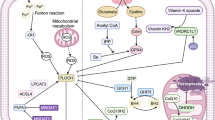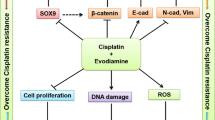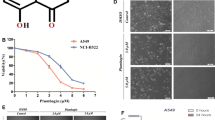Summary
Fucoidan is one of the main bioactive components of polysaccharides. The current study was focused on the anti-tumor effects of fucoidan on human heptoma cell line HepG2 and the possible mechanisms. Fucoidan treatment resulted in cell cycle arrest and apoptosis of HepG2 cells in a dose-dependent manner detected by MTT assay, flow cytometry and fluorescent microscopy. The results of flow cytometric analysis revealed that fucoidan induced G2/M arrest in the cell cycle progression. Hoechst 33258 and Annexin V/PI staining results showed that the apoptotic cell number was increased, which was associated with a dose-dependent up-regulation of Bax and down-regulation of Bcl-2 and p-Stat3. In parallel, the up-regulation of p53 and the increase in reactive oxygen species were also observed, which may play important roles in the inhibition of HepG2 growth by fucoidan. In the meantime, Cyclin B1 and CDK1 were down-regulated by fucoidan treatment. Down-regulation of p-Stat3 by fucoidan resulted in apoptosis and an increase in ROS in response to fucoidan exposure. We therefore concluded that fucoidan induces apoptosis through the down-regulation of p-Stat3. These results suggest that fucoidan may be used as a novel anti-cancer agent for hepatocarcinoma.
Similar content being viewed by others
References
Li B, Lu F, Wei XJ, et al. Fucoidan: structure and bioactivity. Molecules, 2008, 13(8):1671–1695
Chizhov AO, Dell A, Morris HR, et al. A study of fucoidan from the brown seaweed Chorda filum. Carbohydr Resh, 1999, 320(1–2):108–119
Wang J, Zhang QB, Zhang ZS, et al. Antioxidant activity of sulfated polysaccharide fractions extracted from Laminaria japonica. Int J Biol Macromol, 2008, 42(2): 127–132
Matsumoto S, Nagaoka M, Hara T, et al. Fucoidan derived from Cladosiphon okamuranus Tokida ameliorates murine chronic colitis through the downregulation of interleukin-6 production on colonic epithelial cells. Clin Exp Immunol, 2004, 136(3):432–439
Makarenkova I, Kompanets GG, Besednova NN, et al. Inhibiting effects of fucoidans on Hantaan virus adsorption on a model of peritoneal macrophages in vitro. Vopr Virusol, 2008, 53(3):12–15
Hayashi K, Nakano T, Hashimoto M, et al. Defensive effects of a fucoidan from brown alga Undaria pinnatifida against herpes simplex virus infection. Int Immunopharmacol, 2008, 8(1):109–116
Kwon MJ, Nam TJ. Porphyran induces apoptosis related signal pathway in AGS gastric cancer cell lines. Life Sci, 2006, 79(20):1956–1962
Bilan MI, Grachev AA, Ustuzhanina NE, et al. Structure of a fucoidan from the brown seaweed Fucus evanescens C. Ag. Carbohydr Res, 2002, 337(8):719–730
Aisa Y, Miyakawa Y, Nakazato T, et al. Fucoidan induces apoptosis of human HS-sultan cells accompanied by activation of caspase-3 and down-regulation of ERK pathways. Am J Hematol, 2005, 78(1):7–14
Philchenkov A, Zavelevich M, Imbs T, et al. Sensitization of human malignant lymphoid cells to etoposide by fucoidan, a brown seaweed polysaccharide. Exp Oncol, 2007, 29(3):181–185
Boo HJ, Hyun JH, Kim SC, et al. Fucoidan from Undaria pinnatifida induces apoptosis in A549 human lung carcinoma cells. Phytother Res, 2011, 25(7):1082–1086
Nagamine T, Hayakawa K, Kusakabe T, et al. Inhibitory effect of fucoidan on Huh7 hepatoma cells through downregulation of CXCL12. Nutr Cancer, 2009, 61(3):340–347
Nowak AK, Chow PK, Findlay M. Systemic therapy for advanced hepatocellular carcinoma: a review. Eur J Cancer, 2004, 40(10):1474–1484
Wang XW, Hussain SP, Huo TI, et al. Molecular pathogenesis of human hepatocellular carcinoma. Toxicology, 2002, 181(2):43–47
Hu W, Kavanagh JJ. Anticancer therapy targeting the apoptotic pathway. Lancet Oncol, 2003, 4(12):721–729
Fukahori S, Yano H, Akiba J, et al. Fucoidan, a major component of brown seaweed, prohibits the growth of human cancer cell lines in vitro. Mol Med Report, 2008, 1(4):537–542
Haneji K, Matsuda T, Tomita M, et al. Fucoidan extracted from Cladosiphon okamuranus Tokida induces apoptosis of human T-cell leukemia virus type 1-infected T-cell lines and primary adult T-cell leukemia cells. Nutr Cancer, 2005, 52(2):189–201
Riou D, Colliec-Jouault S, Pinczon du Sel D, et al. Antitumor and antiproliferative effects of a fucan extracted from Ascophyllum nodosum against a non-small-cell bronchopulmonary carcinoma line. Anticancer Res, 1996, 16(3A):1213–1218
Liu W, Huang XF, Qi Q, et al. Asparanin A induces G(2)M cell cycle arrest and apoptosis in human hepatocellular carcinoma HepG2 cells. Biochem Biophys Res Commun, 2009, 381(4): 700–705
Neuzil J, Wang XF, Dong LF, et al. Molecular mechanism of mitocan-induced apoptosis in cancer cells epitomizes the multiple roles of reactive oxygen species and Bcl-2 family proteins. FEBS lett, 2006, 580(22): 5125–5129
Sharma M, Agrawal SK, Sharma PR, et al. Cytotoxic and apoptotic activity of essential oil from Ocimumviride towards COLO 205 cells. Food Chem Toxicol, 2010, 48(1): 336–344
Huang P, Feng L, Oldham EA, et al. Superoxide dismutase as a target for the selective killing of cancer cells. Nature, 2000, 407(6802):390–395
Trachootham D. Selective elimination of cancer cells by PEITC: biological basis and therapeutic implications. 2008.
Dewson G, Kluck RM. Bcl-2 family-regulated apoptosis in health and disease. Cell Health Cytoskel, 2010, 2:9–22
Reyes-Zurita FJ, Rufino-Palomares EE, Lupianez JA, et al. Maslinic acid, a natural triterpene from Olea europaea L., induces apoptosis in HT29 human colon-cancer cells via the mitochondrial apoptotic pathway. Cancer lett, 2009, 273(1):44–54
Author information
Authors and Affiliations
Corresponding author
Additional information
This work was supported by grants from the Wuhan Municipal Science and Technology Research Project (No. 201260523185) and the Public Science and Technology Research Funds Projects of Ocean (No. 201005013)
Rights and permissions
About this article
Cite this article
Roshan, S., Liu, Yy., Banafa, A. et al. Fucoidan induces apoptosis of HepG2 cells by down-regulating p-Stat3. J. Huazhong Univ. Sci. Technol. [Med. Sci.] 34, 330–336 (2014). https://doi.org/10.1007/s11596-014-1278-0
Received:
Revised:
Published:
Issue Date:
DOI: https://doi.org/10.1007/s11596-014-1278-0




